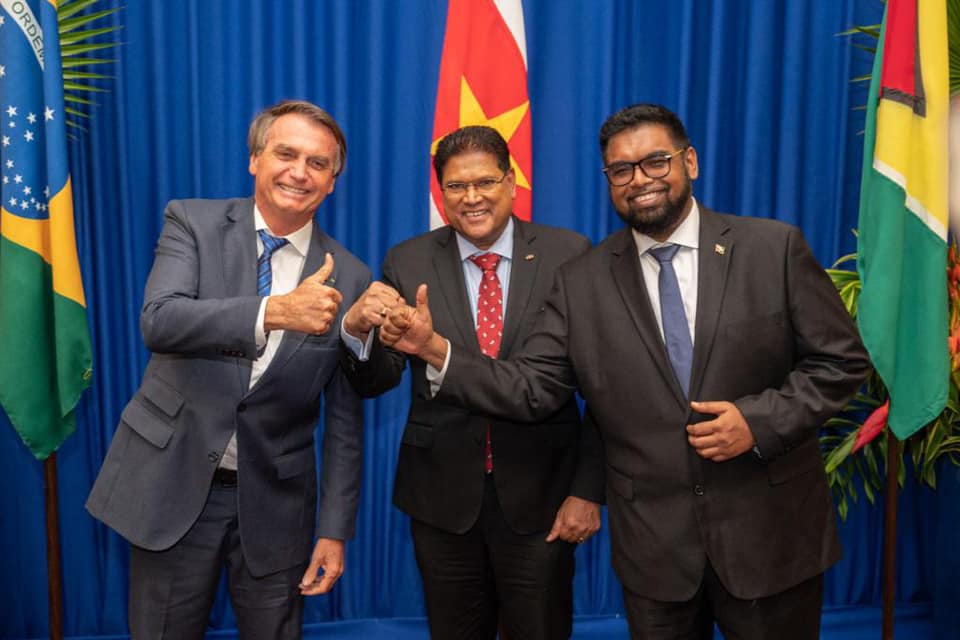South American oil nations sign MoU to explore development of energy corridor
 (L to R) President of Brazil, Jair Bolsonaro, President of Suriname, Chandrikapersad Santokhi and Guyana’s President, Dr. Mohamed Irfaan Ali met in Suriname on January 20, 2022.
(L to R) President of Brazil, Jair Bolsonaro, President of Suriname, Chandrikapersad Santokhi and Guyana’s President, Dr. Mohamed Irfaan Ali met in Suriname on January 20, 2022.
Guyana’s President Dr. Mohamed Irfaan Ali said on Monday the South American country along with Brazil and Suriname will explore the development of an energy corridor linking the oil producing nations.
He said that Guyana is also committed to the wider goal of energy security for the countries of the northern cone of South America: Brazil, Suriname and French Guiana.
“Just last Thursday, I, met with the presidents of Brazil and Suriname, and we agreed through a Memorandum of Understanding to explore the development of an energy corridor linking our respective states.”
Mr. Ali was at the time delivering a keynote address to over 300 participants at the Caribbean Sustainable Energy Conference 2022.
In the area of energy security, he said energy generation cannot be reduced in the near or medium-term since it will impact negatively on economic growth and prosperity. As such, he said diversifying the generation of energy towards cleaner sources is key.
The Guyanese head of state assured that energy security remains central to the country’s plans for Net-Zero by 2050. However, he stressed that environmental sustainability is not founded solely on energy security. He reminded that Guyana was among the first regional economies to develop a Low Carbon Development Strategy (LCDS); the agreement provided a model of how a country can sustainably manage its forests and secure payments in return.
The LCDS is being expanded to include the provision of environmental services, the protection of Guyana’s biodiversity and water resources, the development of the marine economy and the promotion of climate resilience. The enhanced LCDS would also allow Guyana to further decarbonise onshore economic activities, thereby further reducing carbon emissions.
“We should not be asking ourselves whether we can achieve Net Zero by 2050, but whether we can afford not to,” Mr. Ali participants at the conference. “The scientific community has made its predictions: life on the planet will become perilous should the rise in global temperatures not be checked. The target of Net-Zero by 2050 is therefore imperative for the survival of the planet.”
He however emphasised that achieving Net Zero cannot be done in abstract since food security, good social services, economic growth and national prosperity will remain top priorities. He noted, too, that nations also need to be prepared to address developmental gaps, global inequality and disparities, and uneven trade relations, as all these factors are hindrances in achieving the target.
Mr. Ali said while there are many examples in ecosystems, biodiversity and environmental services that are all critical in alternative revenue streams key to achieving Net Zero, the question is the same, is the market ready to pay?
“After all, survival requires resources, and if we value the survival of the planet, we must value the importance of these services and incentivise the world to safeguard these in achieving Net Zero,” he said.
Guyana, he reiterated, will remain a strong advocate for greater international cooperation to reverse the adverse effects of climate change and will lead through advocacy and being an example to the region.
